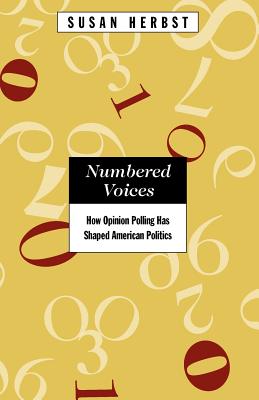Quantifying the American mood through opinion polls appears to be an unbiased means for finding out what people want. But in Numbered Voices, Susan Herbst demonstrates that the way public opinion is measured affects the use that voters, legislators, and journalists make of it.
Exploring the history of public opinion in the United States from the mid-nineteenth century to the present day, Herbst shows how numbers served both instrumental and symbolic functions, not only conveying neutral information but creating a basis authority. Addressing how the quantification of public opinion has affected contemporary politics and the democratic process, Herbst asks difficult but fundamental questions about the workings of American politics. "An original and thought-provoking analysis of why we have polls, what they accomplish, and how they affect the current political scene. Herbst’s scholarship is impeccable, her writing is clear and crisp, and her findings are original. . . . Every reader will benefit by carefully weighing the issues she raises and the conclusions she draws."--Doris A. Graber, Political Science Quarterly"An intelligent, theoretically rich, and historically broad account of public opinion over several millennia. . . . The historical accounts are interesting and her interpretations are thought-provoking."--Paul Brace, Journal of American History| FindBook |
有 1 項符合
Numbered Voices: How Opinion Polling Has Shaped American Politics的圖書 |
 |
Numbered Voices: How Opinion Polling Has Shaped American Politics 作者:Herbst 出版社:University of Chicago Press 出版日期:1995-08-15 語言:英文 規格:平裝 / 235頁 / 21.6 x 14 x 1.8 cm / 普通級 |
| 圖書館借閱 |
| 國家圖書館 | 全國圖書書目資訊網 | 國立公共資訊圖書館 | 電子書服務平台 | MetaCat 跨館整合查詢 |
| 臺北市立圖書館 | 新北市立圖書館 | 基隆市公共圖書館 | 桃園市立圖書館 | 新竹縣公共圖書館 |
| 苗栗縣立圖書館 | 臺中市立圖書館 | 彰化縣公共圖書館 | 南投縣文化局 | 雲林縣公共圖書館 |
| 嘉義縣圖書館 | 臺南市立圖書館 | 高雄市立圖書館 | 屏東縣公共圖書館 | 宜蘭縣公共圖書館 |
| 花蓮縣文化局 | 臺東縣文化處 |
|
|
圖書介紹 - 資料來源:博客來 評分:
圖書名稱:Numbered Voices: How Opinion Polling Has Shaped American Politics
|











